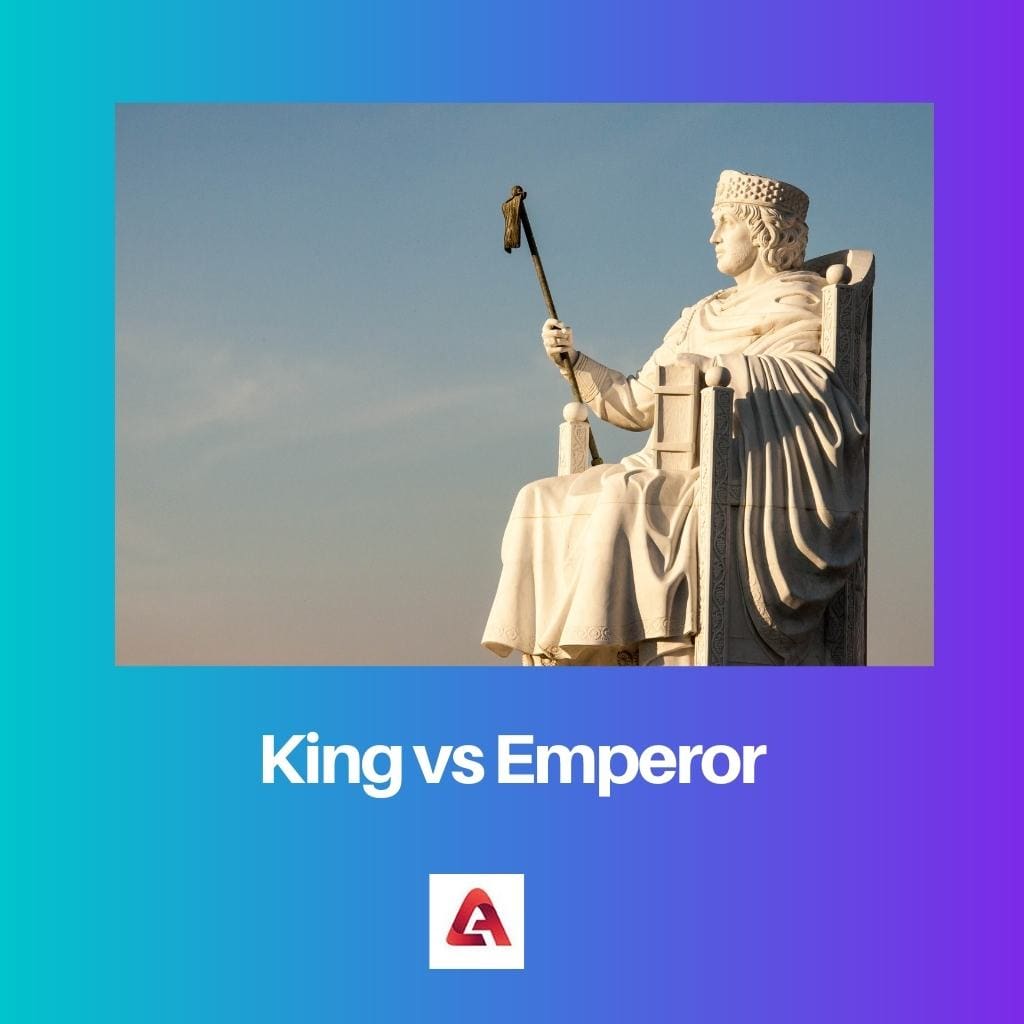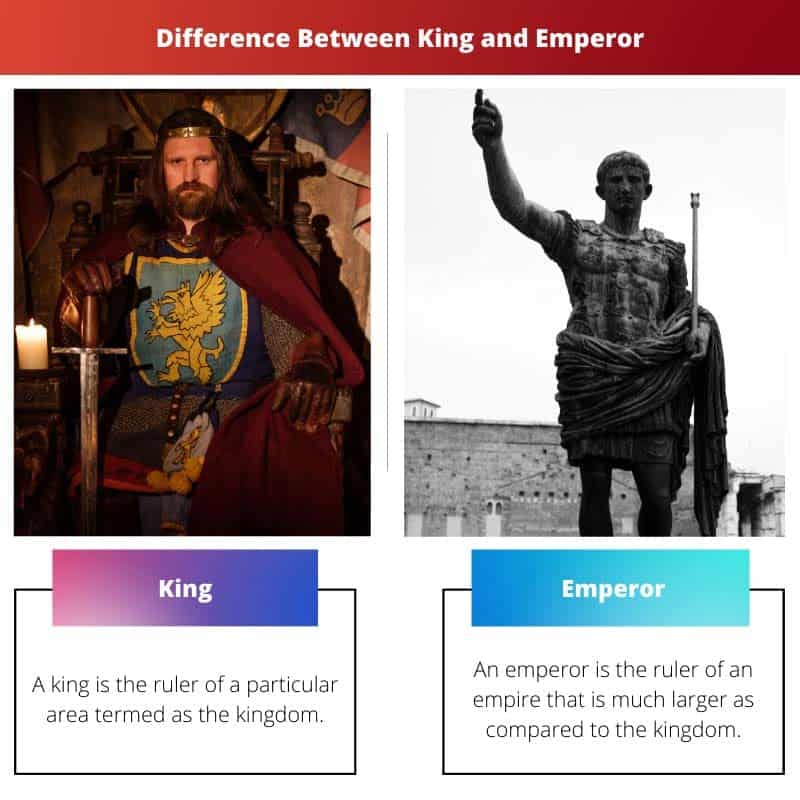Since the existence of mankind, there has been a practice or tradition of rulers. A ruler is a person who takes forward the entire population together and works for their betterment.
A ruler can also be called King, emperor, leader, monarch, shahensha, etc. Each kingdom, nation or country has a different title for the highest power of the kingdom.
Key Takeaways
- A King is a male ruler of a country or region, while an Emperor is a monarch who rules over an empire.
- A King’s power is limited to a specific territory or region, while an Emperor’s power extends beyond a single territory and encompasses multiple kingdoms or regions.
- The title of Emperor is associated with a higher degree of power and prestige than the title of King.
King vs Emperor
King rules one fairly homogenous territory called a nation or kingdom; a kingdom consists of a single nation or ethnicity. Emperors wield power over a fairly heterogeneous territory called an empire; an empire can include multiple nations, ethnic groups, and even races.

King and emperor are two titles that are confused with each other and, as a result, are used interchangeably, but they have some differences. A king is a ruler or head of a particular area or king, and an emperor is a ruler of a larger empire, and he poses all the power related to the empire.
Comparison Table
| Parameter of Comparison | King | Emperor |
|---|---|---|
| What is it? | A king is the ruler of a particular area termed the kingdom; he is the person who can take decisions regarding the kingdom. | An emperor is also known as the King of kings. An emperor is the ruler of an empire much larger than the kingdom. He is the highest power in the empire. |
| Sources of being in power | The power is transferred to a king by inheritance, election, or conquest. | An emperor comes to power either by inheritance or by conquest. |
| Types of power in hand | A king only has the maximum power within his kingdom but has nothing to do with other kingdoms. The title of the king is more of a political title because sometimes he is not the highest power in an area. | An emperor has the maximum powers in his hands since the whole empire is under him; in other words, absolute powers of the territory reside with him. |
| Ruling areas or reach of the power | A king rules a homogeneous territory such as a country or nation or some particular kingdom. | An Emperor is the ruler of a large territory, such as a group of several countries. |
| Divine status | Kings are sometimes called Gods or people sent by God to help the people of their kingdoms. | Like kings, emperors may also be considered as God in their empires or a messenger or person sent by God or has divine powers. |
What is a King?
King is the title given to the male leader of the kingdom, and his female equivalent is queen. A king is the ruler of a particular area, called a kingdom or nation.
A king comes to power by inheritance, by-elections and by conquest. The king is the highest order within a defined kingdom.
The title of king is more defined for political purposes. A king rules a homogeneous territory such as a kingdom, nation or country.
In the early times, people used to refer to a king as equivalent to God or a person sent by God to help them. In modern times, the title king refers to the ruler of modern monarchies.

What is an Emperor?
An emperor is the sovereign ruler of an empire; his equivalent is an empress. An emperor is also entitled to the King of kings since it is the highest rank.
An emperor always looks forward to annexing more areas.
An emperor is given power either by inheritance or by conquering an empire. An emperor rules a larger area, such as a group of nations.
An Emperor also has more powers; he takes important decisions related to the military, trade, development, etc.
Japan is the only country with an Emperor in recent or modern times.

Main Differences Between King and Emperor
- A king is the ruler of a kingdom, whereas an emperor is the ruler of an empire.
- The king may not be the highest power in the kingdom, but an emperor is always the highest power in a territory. Therefore, an emperor is higher in rank as compared to a king.
- The power is transferred to a king or emperor through inheritance, elections or conquest.
- The title of a king is more for political purposes, while the title of the emperor is entitled to the absolute powers of the territory.
- A king always rules a homogeneous territory such as a kingdom or nation; conversely, an emperor rules an empire consisting of several kingdoms or nations.
- Kings and emperors are sometimes referred to as a person sent by God to help people, an emperor is also referred to as the King of kings.
- A female king is known as Queen, whereas a female emperor is called an Empress.
- Spain has a king in the modern world, and Japan is the only country with an emperor.

- https://books.google.com/books?hl=en&lr=&id=BPotkOzzeGYC&oi=fnd&pg=PP11&dq=king+and+emperor&ots=7Uj4aByLT9&sig=7vKfyTxwA3LK5OAFiZbXWugZ4ok
- https://www.journals.uchicago.edu/doi/pdfplus/10.1086/363981

Wow, so much new knowledge for the day! Very informative!
The article offers an in-depth analysis of the roles of kings and emperors throughout history.
Absolutely, it’s a great resource for anyone seeking an understanding of these historical roles.
This article is a valuable source of knowledge for anyone desiring to understand the differences between kings and emperors.
Absolutely, it helps to clarify any ambiguities and misconceptions on the topic.
Effective use of clear and concise language makes the article an interesting read.
Indeed, the article’s clarity adds to its appeal in terms of education and interest.
I appreciate the straightforward nature of the explanation in this article.
The article explains very well the difference between these two titles. It’s important not to use them interchangeably, as a king might not have the same authority as an emperor.
I am very impressed with the detailed comparison between the two titles. The history lesson was also very insightful.
Your article could be even more enlightening if certain historical examples were provided to further emphasize the points being made.
I would also appreciate some historical contexts or stories to illustrate the comparison made in the article.
This article presents the basic principles of the roles of kings and emperors very clearly.
Yes, the differences have been articulated very well, providing a comprehensive understanding.
The comparison table makes it very easy to understand the key differences between the roles of kings and emperors.
Exactly, it provides a clear overview of the unique aspects of each title.
I agree, the table is particularly useful for a quick, clear comparison.
A well-written and illuminating article that breaks down the key nuances between kings and emperors, providing a rich understanding.
I am thoroughly impressed with the lucid nature of the comparison and contrast offered in this article.
The article discusses the topic with a great deal of accuracy and detail.
This is an excellent reference for those seeking distinctions between kings and emperors.
It’s a precise and comprehensive review of the key points.